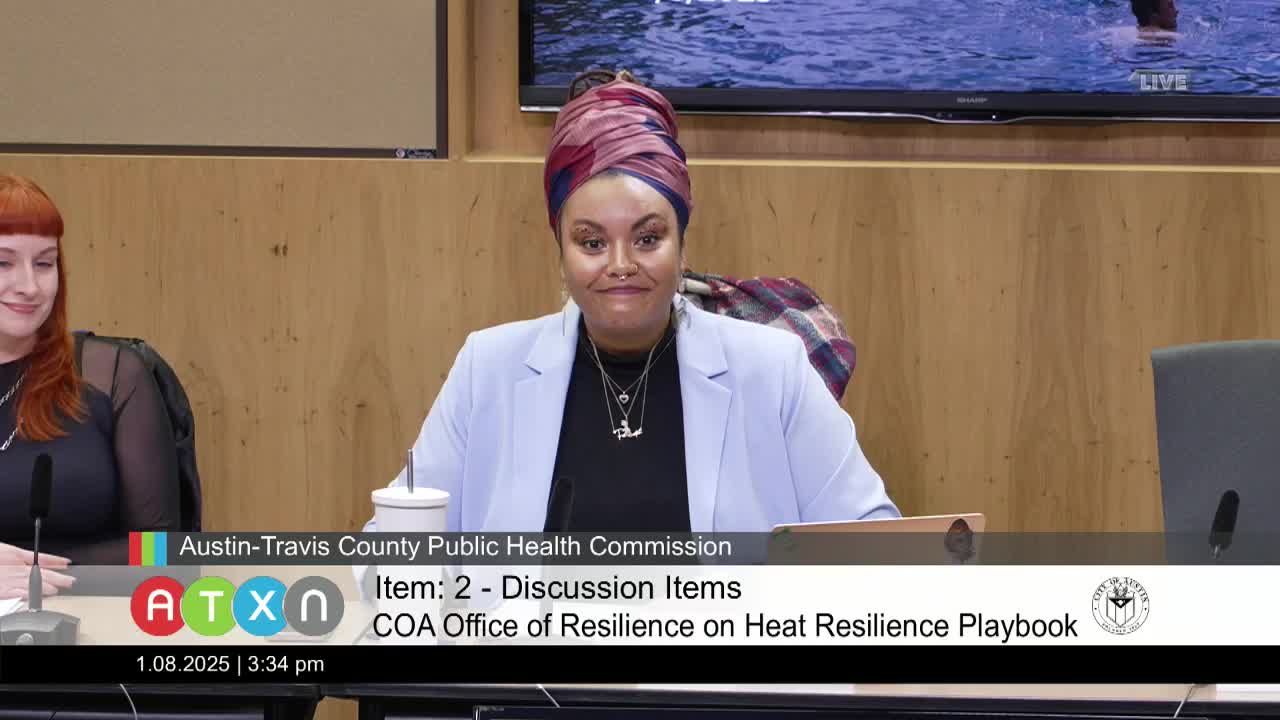Austin officials present Heat Resilience Playbook outlining 56 actions to shield vulnerable communities
Get AI-powered insights, summaries, and transcripts
Subscribe
Summary
City staff presented a Heat Resilience Playbook summarizing 56 actions across individual, neighborhood and citywide strategies; commissioners asked about health surveillance, outreach to vulnerable residents, and next steps for turning the Playbook into an actionable plan.
Mark Coudaire, with the City of Austin Office of Sustainability and Resilience, presented the Heat Resilience Playbook and described it as a compendium of actions the city and partners are taking to reduce heat exposure in Austin.
The Playbook is intended as a catalog, not a plan with schedules or budgets. "It is not a plan. It doesn't have a timeline. It doesn't have a budget," Coudaire said, adding the document is meant to "elevate all the things the city is doing and would like to be doing to mitigate heat in the community." The city grouped 56 actions into three tiers — individual/health, neighborhood and citywide — and identified department “champions” for each strategy.
The Playbook is rooted in prior city climate work and community engagement. Coudaire said city staff began climate-impact work in 2017, produced a Climate Resilience Action Plan in 2018, and later used community sensor deployments and conversations — particularly in the eastern crescent — to map social vulnerability and heat exposure. He summarized recent temperature trends, stating that in 2011 the city recorded about 90 days above 100°F, in 2023 roughly 80 days above 100°F and about 40 days above 105°F, and that last year was the hottest on record in Austin.
What’s in the Playbook: Coudaire described examples from each tier. Individual and health strategies emphasize communication before, during and after heat events, outreach to people experiencing homelessness and protective measures for outdoor workers. Neighborhood actions include targeted weatherization programs, increasing access to indoor cooling spaces such as libraries and recreation centers, planting trees and creating “cool corridors” that combine shade, water fountains and bus shelters. Citywide actions include using codes and housing policy to improve insulation, pursuing a goal to reach 50% tree canopy by 2050, and strengthening energy resilience through solar and battery backup at critical sites.
Commissioners pressed staff on health surveillance, outreach and next steps. Commissioner Poindexter asked whether the Playbook includes health‑effects data; Coudaire said Austin Public Health performs heat surveillance — tracking emergency medical service encounters and emergency department visits where heat is identified — and that trends show spikes when temperatures change rapidly and extreme multi‑day heat events can overwhelm coping capacity. Commissioner Wallace and others asked how the city is reaching residents who do not use government websites; Coudaire emphasized partnerships with community organizers, faith‑based institutions and community health workers, and pointed to success stories such as a resident who used Austin Energy weatherization to keep her home cool.
Commissioners also asked about turning the Playbook into a funded implementation effort. Coudaire reiterated that the Playbook is not a funded plan but said departments are pursuing discrete projects (for example, funding for new bus shelters, drinking fountains, and pilot cooling corridor elements). He noted the Playbook was developed collaboratively with Austin Public Health, Austin Energy, Housing, Planning, the airport, Cap Metro and Travis County, and that the city is coordinating with the University of Texas on climate projections and sensor data.
The presentation prompted several suggested next steps from the commission: review of the Playbook's recommended strategies in more granular form, discussion of whether the commission might propose specific budget recommendations during the city's budget cycle, and exploring whether an emergency preparedness annex for high heat combined with grid outages is needed. Coudaire said the city has an existing Heat Plan within Homeland Security Emergency Management but agreed elements such as combined heat+blackout scenarios could be improved.
The commission agreed to add related items to future agendas, including the Austin–Travis County Community Health Improvement Plan priorities and potential budget guidance.
Ending: The commission thanked staff for the presentation and asked staff to circulate the Playbook and any supporting materials. Coudaire said the Playbook is available online and staff will provide the report to commissioners on request.
